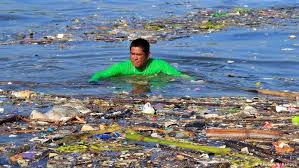DEAR DEB Teach Our Children Well
Just last week the PBS News Hour sponsored The Plastic Problem and the Pioneer Press in St. Paul featured a front-page article regarding the dilemma humanity faces due to the waste we produce. Those of us who have been around for fifty or more years remember warnings about over-population, reliance on pesticides, reliance on fossil fuels, accumulation of nuclear waste, the depletion of the ozone layer and the buildup of trash from rampant consumerism. Back in my teens and twenties sermons were preached on the stewardship of the earth and our responsibility to care for each other and the earth. Rampant consumption was scorned. We were urged to “teach our children well…” by Crosby, Stills, Nash and Young, and many of us took this to mean our responsibility as parents, teachers and guides was to teach by example and urge our children toward the morality of keeping the earth clean and safe for future generations.
We must cease our carelessness and take individual and collective responsibility to reduce the harm our consumption and waste bring to our world.
Each year Ramsey County and the City of St. Paul produce a flyer and update their websites with specific information on what can be recycled and where and how. Sadly, even with adherence to these programs, a surprising percentage of what we put in the recycling bin does not get recycled or put to any earth friendly use.
I believe reducing harmful environmental effects from waste products can best be tackled by research and development toward new methods, technologies and products, and feel strongly that corporations and retailers must cease to use products destructive to the environment.
I am interested in the role I can play in harm reduction. For example, over the past several years, as I noticed the use of Keurig Pods and/or Styrofoam cups offered in service environments such as health clinics, fitness centers and banks, I contacted either the purchasing agent or facilities management. I asked if they might consider changing their practices. Without exception the people I approached said they had simply not thought of the harm but only of the added expense of changing their practices. I began carrying my own cup and continued to ask if they would look into possible solutions. My YMCA started a “go green” initiative urging members to bring their own cups and offered compostable paper cups to use sparingly. Health East Midway dropped Styrofoam while Allina at Bandana Square kept using it. Wells Fargo on Grand dropped the Styrofoam and finally, when I last checked, so did US Bank. Kowalski’s has altered some of its plastic packaging and has added some recyclable, pressed paper or compostable options. I believe the consumer can have an enormous effect on our local businesses by simply refusing to buy items that will not break down in the environment.
Some tips I follow:
Buy meat wrapped in butcher paper. Bring reusable produce bags for fruits and vegetables. Styrofoam or black plastic? Do not buy it. Let the store know you are refusing it. Buy products in glass jars rather than plastic whenever possible. Shop the bulk aisle and bring canisters or glass containers for syrups, grains, nuts, dried fruits, honey and syrup. Buy glass-bottled wine and spirits. Those wine boxes house a plastic or plasticized foil liner that will not biodegrade. Try to stay away from single use plastic. Buy cosmetics and make-up in glass containers that can be rinsed and recycled. Try a new bar style shampoos and conditioners.
A 2016 article by Lara Newcomer at Greatist.com described one study that if residents in a Minneapolis-size city purchased the most minimally packaged versions of 10 common household products, the city could eliminate 150,000 tons of trash annually. Here’s a simple list of helpful tips adapted from that same article.
Recycle when you can but when in doubt, throw it out. Choose recycled, recyclable, and/or biodegradable packaging. Choose reusable products steering away from plastic whenever possible. Buy less stuff. Buy in bulk. Choose products with minimal packaging. Use your own bags and containers when shopping or eating out. Ditch plastic water bottles. Buy used products. Repair and maintain products. Advocate for companies to reduce packaging and use biodegradable or truly recyclable options.




